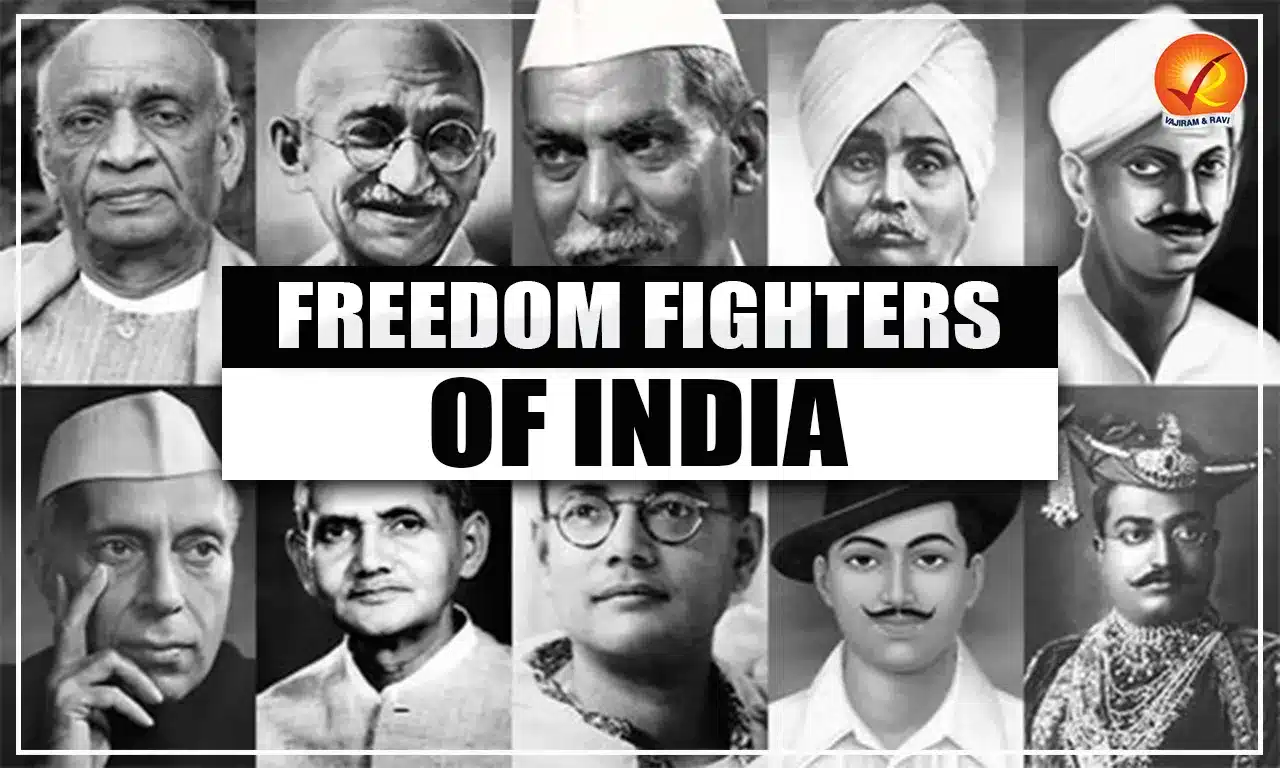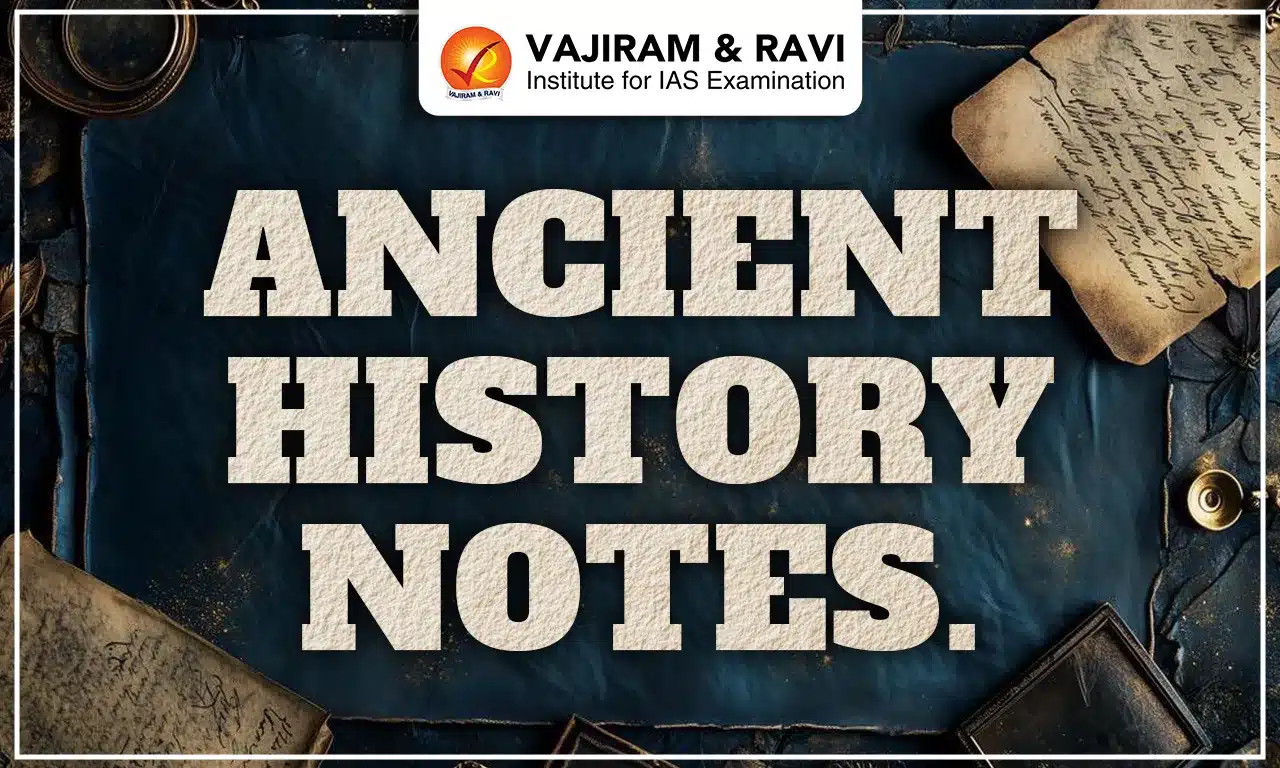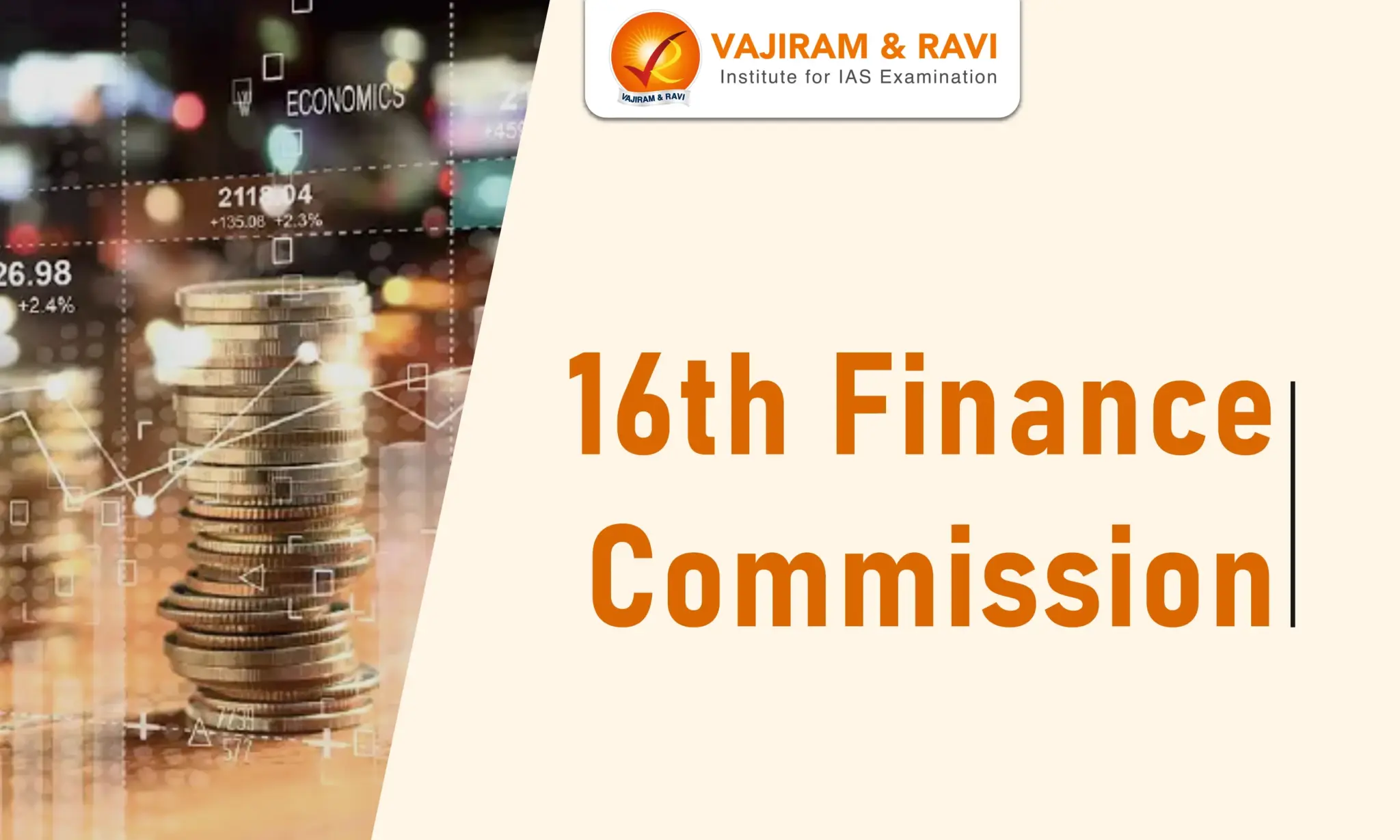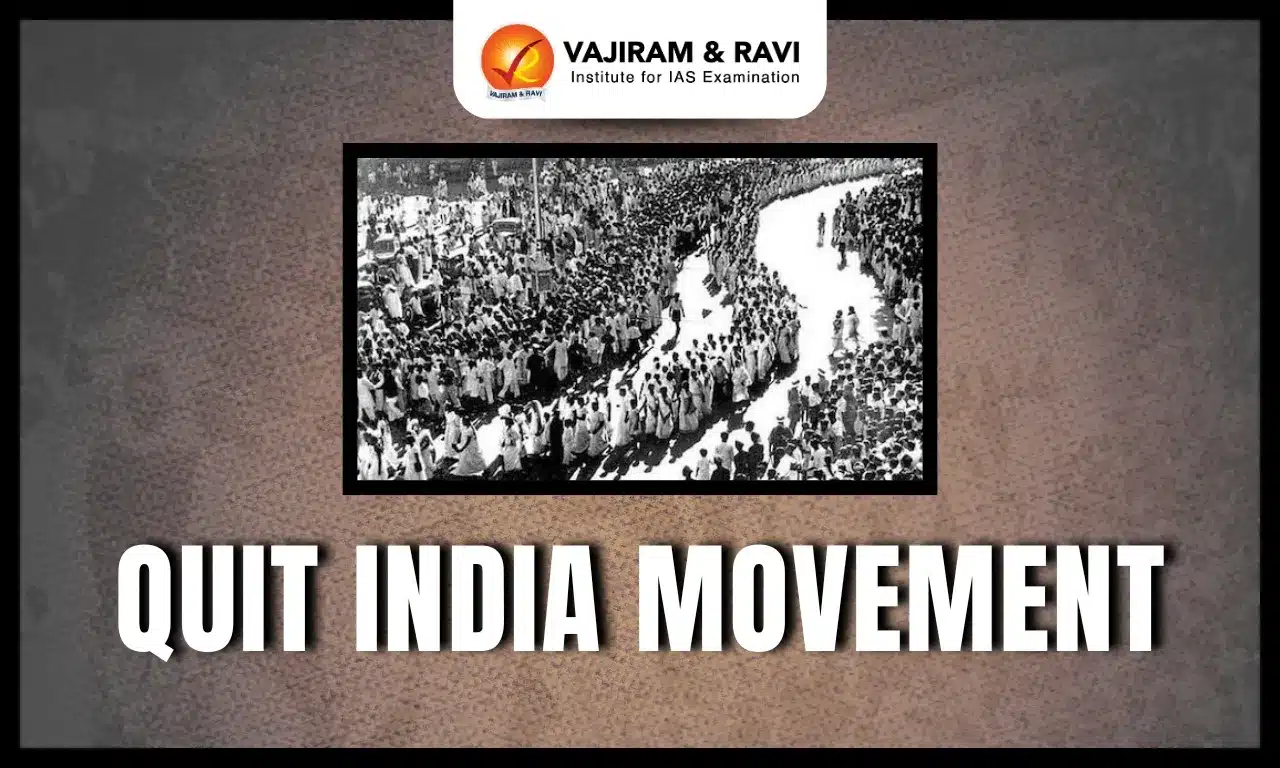India’s Freedom Struggle (1857-1947) was shaped by influential leaders who are called Freedom Fighters of India like Mahatma Gandhi, who pioneered nonviolent resistance; Jawaharlal Nehru, the first Prime Minister; Sardar Vallabhbhai Patel, who unified India’s princely states; Subhas Chandra Bose, leader of the Indian National Army; Dr. B.R. Ambedkar, architect of the Constitution; and Sarojini Naidu, a key women’s rights advocate.
Dadabhai Naoroji exposed British exploitation, while Pingali Venkayya designed the national flag. Their leadership and sacrifices remain central to India's path to independence.
Freedom Struggle Timeline
India's Freedom struggle for independence from British rule was a century-long journey marked by major events and the efforts of many influential leaders. The timeline highlighting key events and personalities involved from 1857 to 1947 is as follows:
| Year | Events | Personalities |
| 1857 | Revolt of 1857: The First War of Independence against British rule, marked by uprisings across northern India. | Mangal Pandey, Rani Lakshmibai, Nana Sahib, Tantia Tope |
| 1885 | Formation of the Indian National Congress (INC): A platform for political dialogue and demands for greater Indian participation in governance. | A.O. Hume, Dadabhai Naoroji |
| 1905 | Partition of Bengal: Divided Bengal into Hindu and Muslim-majority regions, leading to widespread protests. | Bal Gangadhar Tilak, Bipin Chandra Pal |
| 1906 | Formation of the Muslim League: Represented Muslim interests in the struggle for independence. | Aga Khan, Mohammad Ali Jinnah |
| 1916 | Lucknow Pact: Agreement between INC and Muslim League for joint action against British rule. | Bal Gangadhar Tilak, Mohammad Ali Jinnah |
| 1917 | Champaran Satyagraha: Gandhi's first active involvement in Indian politics, addressing farmers' grievances against oppressive plantation systems. | Mahatma Gandhi |
| 1919 | Rowlatt Act: Passed to suppress dissent; led to widespread protests and the Jallianwala Bagh Massacre. | General Dyer (British) |
| 1920-22 | Non-Cooperation Movement: Gandhi called for nonviolent resistance against British goods and institutions. | Mahatma Gandhi, Jawaharlal Nehru, Sardar Vallabhbhai Patel |
| 1928 | Nehru Report: Demands for constitutional reforms presented by the INC; led to the formation of the Simon Commission. | Motilal Nehru, Jawaharlal Nehru |
| 1930 | Salt March (Dandi March): Gandhi led a march to produce salt in defiance of British laws, symbolizing civil disobedience. | Mahatma Gandhi, Sarojini Naidu |
| 1931 | Gandhi-Irwin Pact: The agreement allowing Gandhi to attend Round Table talks in London; marked a temporary truce. | Mahatma Gandhi, Lord Irwin |
| 1935 | Government of India Act 1935: Introduced limited self-governance but fell short of full independence demands. | - |
| 1942 | Quit India Movement: Launched by Gandhi demanding an end to British rule; faced severe repression but galvanized national sentiment. | Mahatma Gandhi, Jawaharlal Nehru, Sardar Vallabhbhai Patel, Subhas Chandra Bose |
| 1946 | Cabinet Mission Plan: Proposed a framework for Indian self-governance; communal tensions escalated during this period. | Lord Pethick-Lawrence, Jawaharlal Nehru |
| June 1947 | Mountbatten Plan: Outlined the partition of India into two independent nations, India and Pakistan. | Lord Mountbatten, Jawaharlal Nehru, Muhammad Ali Jinnah |
| August 15, 1947 | India gained independence from British rule; marked by celebrations and communal violence due to partition. | - |
Freedom Fighters of India List
The Freedom Fighters of India were brave men and women who fought against British rule to win independence for the country. List of prominent freedom fighters and leaders of India's independence movement:
1. Mahatma Gandhi
Mahatma Gandhi (1869-1948) returned to India in 1915, promoting inclusive nationalism. He led the Champaran Satyagraha (1917) against the tinkathia system, the Ahmedabad Mill Strike (1918) for workers' wages, and supported Kheda peasants (1918) for tax relief. Gandhi's Satyagraha against the Rowlatt Act in 1919 gained mass support, while the Non-Cooperation Movement (1920-22) followed the Jallianwala Bagh massacre. The Civil Disobedience Movement (1930-34) included the Salt March, and the Quit India Movement (1942) demanded immediate British withdrawal, ultimately leading to India’s independence.
2. Jawaharlal Nehru
Jawaharlal Nehru (1889-1964) was central to movements like Non-Cooperation, Salt March, Quit India, and the INA Trials. As Congress President, he championed full independence and socialist policies. As Prime Minister, Nehru focused on industrialization, land reforms, and education. His non-alignment policy made India a leader during the Cold War. His writings, like The Discovery of India, reflect his deep understanding of India’s history and culture.
3. Sardar Vallabhbhai Patel
Sardar Vallabhbhai Patel (1875–1950), the "Iron Man of India," was a key leader in India’s freedom struggle and post-independence unification. Known for his leadership in movements like Kheda and Bardoli Satyagrahas, he also integrated over 560 princely states into the Indian Union as Deputy Prime Minister. Patel’s vision shaped the All India Services, strengthening India’s administrative framework. His legacy of unity is honoured through the Statue of Unity.
4. Subhas Chandra Bose
Subhas Chandra Bose (1897-1945) revived the Indian National Army (INA) in 1943 to fight for India’s independence, famously declaring, “Give me blood, and I shall give you freedom.” As Congress President in 1938, he pushed for full independence. He formed the Rani Jhansi Regiment, India’s first women’s military unit, sought support from Axis powers during WWII, established the Free India Centre in Berlin, and launched Azad Hind Radio. Imprisoned eleven times during 1920-1941, his resilience is celebrated annually on January 23 as Prakram Day.
5. Dr Bhimrao Ambedkar
Dr. B.R. Ambedkar (1891-1956) was a fierce advocate for Dalit rights, leading movements like the Mahad Satyagraha and founding the Bahishkrit Hitakarini Sabha for Dalit empowerment. As Chairman of the Drafting Committee, he played a pivotal role in shaping the Indian Constitution, ensuring provisions for social justice. India’s first Law Minister, he introduced significant reforms, including the Hindu Code Bill, and in 1956, converted to Buddhism, inspiring millions of Dalits to embrace it as a path to equality.
6. Sarojini Naidu
Sarojini Naidu (1879-1949) was a renowned poet, freedom fighter, and the first Indian woman to lead the INC and serve as a state governor. Known as the "Nightingale of India," she played a significant role in the Salt March and Quit India Movement. A champion of women's rights, she co-founded the Women's Indian Association and advocated for education and legal reforms. Her works like The Golden Threshold and The Gift of India reflect her patriotism and poetic brilliance, with her contributions commemorated on National Women’s Day (13 February).
7. Madam Bhikaji Cama
Madam Bhikaji Cama (1861-1936) was a pioneering freedom fighter known as the "Mother of the Indian Revolution." She raised the "Flag of Indian Independence" in Stuttgart in 1907, co-founded the Paris Indian Society, and published revolutionary papers like Bande Mataram.
8. Pingali Venkayya
Pingali Venkayya (1876-1963), also known as "Patti Venkayya" (Cotton Venkayya), is celebrated for designing the Indian national flag, adopted in 1931. A staunch supporter of Mahatma Gandhi, he actively participated in Vande Mataram and Home Rule Movement. Honoured as the "Father of the Tiranga," Venkayya was recognised with a commemorative stamp in 2009 and a statue in Guntur in 2021.
9. Madan Mohan Malviya
Madan Mohan Malaviya (1861-1946) was a prominent freedom fighter, educator, and social reformer. He co-founded Banaras Hindu University (BHU) in 1916 and advocated for social justice, including the abolition of untouchability. Malaviya was an influential journalist, founded The Leader and Hindustan Times. He opposed the Simon Commission and separate electorates for Muslims, contributing significantly to India's independence movement.
10. Dadabhai Naoroji
Dadabhai Naoroji (1825-1917), a prominent leader and reformer founded the East India Association and played a key role in the Indian National Congress, serving as its president three times. Naoroji was the first British Indian elected to the UK Parliament in 1902. His "Drain of Wealth" theory exposed the economic exploitation of India by Britain. A social reformer, he advocated for women's education and equal rights, leaving a lasting legacy in India's fight for self-rule.
11. Gopal Krishna Gokhale
Gopal Krishna Gokhale (1866-1915) was a key social reformer and political leader, advocating for self-governance, free primary education, and local self-governance. He worked on land revenue reforms and influenced the Morley-Minto Reforms, expanding Indian representation. Gokhale campaigned against the exploitative indentured labour system and mentored Mahatma Gandhi. He founded the Servants of India Society to promote education and social change, leaving a lasting impact on India’s struggle for self-rule and justice.
12. Surendranath Banerjee
Surendranath Banerjee (1848- 1925) was a prominent nationalist and a key figure in India’s early freedom movement. After passing the ICS exam in 1869, he was dismissed in 1874 due to a technicality. He later became a professor and co-founded the Indian National Association in 1876, which merged with the Indian National Congress in 1886. Banerjee opposed the 1905 Bengal partition, supported the Swadeshi movement, and advocated for reforms like the Morley-Minto and Montagu-Chelmsford Reforms.
13. Rabindranath Tagore
Rabindranath Tagore (1861-1941) was a poet, philosopher, and educator who reshaped Bengali literature and global culture. His Nobel-winning Gitanjali and other works made him a literary icon. Tagore founded Visva-Bharati University in Shantiniketan, promoting creative, nature-based education. A supporter of India's independence, he critiqued extreme nationalism and advocated for unity. His songs, including Jana Gana Mana, became national anthems, and his legacy endures in literature, education, and humanism.
14. Bipin Chandra Pal
Bipin Chandra Pal (1858–1932) was a prominent leader in the Indian independence movement, known for advocating Swaraj through direct action. Initially a moderate in the INC, he later joined the extremist faction, supporting the Swadeshi Movement and opposing the Partition of Bengal. Pal promoted social reforms, including the boycott of British goods, and opposed Gandhi’s non-violent approach.
15. Lala Lajpat Rai
Lala Lajpat Rai (1865–1928) was a prominent leader in India’s freedom struggle and a key figure in the Swadeshi and Home Rule Movement. A member of the INC, he advocated for Swaraj, Swadeshi, and the boycott of British goods. Lala Lajpat Rai led protests against the Simon Commission in 1928, where police injured him and later died. He was also a social reformer, supporting education, women’s rights, and the fight against caste discrimination, while authoring influential works like Young India and Unhappy India.
16. Bal Gangadhar Tilak
Bal Gangadhar Tilak (1856-1920) was a prominent nationalist leader, known as "Lokmanya." He joined the Indian National Congress in 1890 and strongly advocated for self-rule, leading the Swadeshi movement and founding the Home Rule League in 1916. Through his newspapers, Kesari and Mahratta, he promoted nationalist ideas. Tilak faced multiple sedition charges and prison sentences but remained a key figure in India's freedom struggle.
17. Aurobindo Ghosh
Aurobindo Ghosh (1872-1950) was a prominent freedom fighter and spiritual leader. After studying in England, he joined the Swadeshi Movement and was imprisoned in the Alipore Bomb Case. Later, he focused on spirituality, developing Integral Yoga in Pondicherry and founding the Sri Aurobindo Ashram in 1926. His major works include Savitri and The Life Divine, where he combined philosophy, spirituality, and human evolution.
18. Bhagat Singh
Bhagat Singh, born on September 27, 1907, in Punjab, was inspired by his family’s role in the freedom struggle. He founded the Naujawan Bharat Sabha and joined the Hindustan Socialist Republican Association, advocating armed resistance. To avenge Lala Lajpat Rai’s death, he killed British officer John Saunders and later protested colonial laws through the Central Assembly bombing. Executed on March 23, 1931, at just 23, his legacy of socialism, rationalism, and sacrifice endures, with Shaheed Diwas observed annually in his honour.
19. Rani Lakshmibai
Rani Lakshmibai (1828-1858) born Manikarnika Tambe became the Queen of Jhansi in 1842. After her husband's death and Jhansi's annexation under the Doctrine of Lapse, she led the 1857 Revolt with unparalleled bravery, famously declaring, “Main apni Jhansi nahin doongi.” Rani Lakshmibai remains a symbol of courage and patriotism in India's freedom struggle.
20. Acharya Vinoba Bhave
Acharya Vinoba Bhave (1895–1982), inspired by Mahatma Gandhi, was a key figure in India’s independence movement and a pioneer of social reform. He participated in the Individual Satyagraha and was a strong advocate for non-violence and justice. Bhave’s Bhoodan Movement (1951) encouraged landowners to donate land to the landless, significantly impacting land reform in India. He also promoted the Sarvodaya philosophy, focusing on welfare for all and self-sufficiency.
Freedom Fighters of India UPSC PYQs
Question 1: Highlight the difference in the approach of Subhash Chandra Bose and Mahatma Gandhi in the struggle for freedom. (UPSC Mains 2016)
Question 2: Mahatma Gandhi and Dr. B. R. Ambedkar, despite having divergent approaches and strategies, had a common goal of amelioration of the downtrodden. Elucidate. (UPSC Mains 2015)
Question 3: Critically discuss the objectives of Bhoodan and Gramdan movements initiated by Acharya Vinoba Bhave and their success. (UPSC Mains 2013)
Question 4: He wrote biographies of Mazzini, Garibaldi, Shivaji, and Shrikrishna; stayed in America for some time; and was also elected to the Central Assembly. He was (UPSC Prelims 2018)
(a) Aurobindo Ghosh
(b) Bipin Chandra Pal
(c) Lala Lajpat Rai
(d) Motilal Nehru
Answer: (c)
Question 5: Who of the following was/were economic critic/ critics of colonialism in India? (UPSC Prelims 2015)
- Dadabhai Naoroji
- G. Subramania Iyer
- R. C. Dutt
Select the correct answer using the code given below.
(a) 1 only
(b) 1 and 2 only
(c) 2 and 3 only
(d) 1, 2 and 3
Answer: (d)
Last updated on February, 2026
→ UPSC Notification 2026 is now out on the official website at upsconline.nic.in.
→ UPSC IFoS Notification 2026 is now out on the official website at upsconline.nic.in.
→ UPSC Calendar 2026 has been released.
→ Check out the latest UPSC Syllabus 2026 here.
→ Join Vajiram & Ravi’s Interview Guidance Programme for expert help to crack your final UPSC stage.
→ UPSC Mains Result 2025 is now out.
→ UPSC Prelims 2026 will be conducted on 24th May, 2026 & UPSC Mains 2026 will be conducted on 21st August 2026.
→ The UPSC Selection Process is of 3 stages-Prelims, Mains and Interview.
→ Prepare effectively with Vajiram & Ravi’s UPSC Prelims Test Series 2026 featuring full-length mock tests, detailed solutions, and performance analysis.
→ Enroll in Vajiram & Ravi’s UPSC Mains Test Series 2026 for structured answer writing practice, expert evaluation, and exam-oriented feedback.
→ Join Vajiram & Ravi’s Best UPSC Mentorship Program for personalized guidance, strategy planning, and one-to-one support from experienced mentors.
→ UPSC Result 2024 is released with latest UPSC Marksheet 2024. Check Now!
→ UPSC Toppers List 2024 is released now. Shakti Dubey is UPSC AIR 1 2024 Topper.
→ Also check Best UPSC Coaching in India
Freedom Fighters of India FAQs
Q1. Who is first freedom fighter in India?+
Q2. Who is the first lady freedom fighter of India?+
Q3. Who is the youngest freedom fighter?+
Q4. How many freedom fighters are there in India?+
Q5. What is the importance of freedom fighters in Indian history?+


















